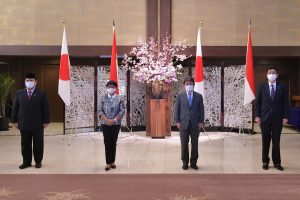Japan and Indonesia have signed an agreement allowing the transfer of Japanese military equipment and technology to the Indonesian armed forces, the latest sign of Tokyo’s desire to intensify its security engagement with the nations of Southeast Asia.
The pact was signed during “two plus two” security talks between the foreign and defense ministers of the two governments, which share concerns about China’s burgeoning influence and territorial claims in the East and South China seas.
The meetings came as masses of Chinese maritime militia vessels continued to loiter threateningly around Whitsun Reef, a low-tide elevation that lies within the Philippines Exclusive Economic Zone (EEZ), a 200-nautical-mile area defined under international maritime law.
Referring obliquely to Chinese assertiveness in the South China Sea, the ministers expressed their “grave concern over the continuation and escalation of an attempt to change the status quo by force” and agreed on the importance of observing international maritime laws, Japan’s Foreign Ministry said in a statement released following the meeting.
Japanese Foreign Minister Motegi Toshimitsu and Defense Minister Kishi Nobuo and their Indonesian counterparts, Retno Marsudi and Prabowo Subianto, also agreed to participate in joint military exercises and jointly develop remote Indonesian islands in the South China Sea. “Together we will maintain and strengthen a free and open maritime order,” Kishi said at a joint news conference after the talks, adding that the two countries will soon make a decision on exactly what defense equipment Indonesia might purchase.
The agreement comes two weeks after Japan and the United States held security talks in which they condemned Beijing’s “coercion and aggression” toward its Asian neighbors. It also follows the visit of Japan’s Prime Minister Suga Yoshihide to Indonesia on his first overseas trip in October of last year. At the time, he and President Joko “Jokowi” Widodo agreed to commence negotiations aimed at an agreement on defense exports. The visit also took Suga to Vietnam, where he signed a similar agreement allowing Japan to export defense equipment and technology to the country.
Arms exports are an increasing area of focus of Japanese security engagement in Southeast Asia. In 2014, then Prime Minister Abe Shinzo ended a decades-long ban on the export of weapons and military hardware, with the intention that Japan could assume a larger regional security role in the face of China’s increasingly assertive actions in the region. Established in 1967, the arms export ban was one of the main pillars of the pacifist foreign policy that Japan adopted after its defeat in World War II.
Since then, Japan has been required to ink formal agreements with potential customers for Japanese arms, and adhere to three rules barring exports to countries involved in conflicts, only allowing exports that contribute to peace and to Japan’s security, and requiring recipient nations to gain Tokyo’s consent for the resale of equipment to third countries.
In addition to Vietnam, the other nation in Southeast Asia with which Japan has signed such an agreement is the Philippines, which last August signed a deal for the purchase of a warning and control radar system developed by Mitsubishi Electric. According to some reports, Suga’s government is also in negotiations with Thailand over possible defense equipment transfers. Japan also has similar agreements with Britain, France, Germany, India, Italy, and the United States.
The agreement is just the latest indication that Japan intends to pursue Abe’s vision of the “free and open Indo-Pacific,” as well as Abe’s special focus on Southeast Asia. As perhaps the quintessential Indo-Pacific nation, and a country that has advanced its own version of the “Indo-Pacific” concept, Indonesia is an important part of Japanese calculations.
In 2006, around the time that Abe first articulated his “Indo-Pacific” vision, the two nations established a strategic partnership that has provided a firm foundation for the expansion of defense ties. In 2017, the two countries established a high-level maritime security dialog, and the following year, Japan pledged to help Indonesia develop remote islands in the South China Sea.
This increased engagement reflects a host of shared interests, rooted in a common concern about China’s growing power and influence in the region, especially at sea. Both face rising maritime tensions with China, in Japan’s case over the Senkaku/Diaoyu Islands in the East China Sea, and in Indonesia’s case in the waters around the Natuna islands, which lie inside the southernmost edge of Beijing’s expansive “nine-dash line” maritime claim. At the same time, both engage in tens of billions worth of trade with China annually.
Against this backdrop, the latest development was perhaps the next logical step in consolidating two decades of strategic convergence between Tokyo and Jakarta, ties that can be expected to advance further in the years to come.

































